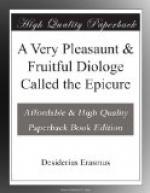we ought alwaies too praye: for in the greeke
tonge an Epicure signifieth an helper. Nowe whan
the lawe of nature was first corrupted with sinne,
whe the law of Moses did rather prouoke euil desires
||F.i.|| then remedy them. Wha the tyraunte Sathanas
reygned in this worlde freely and wythout punishement,
then thys prynce onely, dyd sodenlye helpe mankynde
redy to perishe: wherfore thei erre shamefully
which scoff and bable that CHRIST was one that
was sadd and of a malancolye nature, & that he hath
prouoked vs vnto an vnpleasaunt kynde of lyfe, for
onely he did shewe a kind of liuing most godly and
fullest of al true pleasure, if we might haue the
stone of Tantalus taken awaye from vs. SPVD.
What darke saiyng is this? EDO. It is a mery
tale too laugh at, but this bourd induceth verye graue
and sadde thynges. SPV. I tary too heare ||this
mery conceite, that you name too bee so sage a matter.
HE Thei whiche gaue their studye and diligence
to colour and set furth the preceptes of Philosophie
wyth subtil fables, declare that there was one Tantalus
broughte vnto the table of the goddes, whych was euer
furnished wyth all good fare, and most nete and sumptuous
that myght bee, whan thys straunger shoulde take hys
leave, Iupyter thought it was for his great liberalitie
and highe renoume, that his guest shuld not depart
wythout some rewarde, he wylled him therfore too aske
what he woulde, and he shoulde haue it: Tantalus
(forsooth) lyke a verye leude and foolyshe person,
||F.ii.|| for that he sette all the felicitie and
pleasure of man in the delectation of the bely, and
glotonye, desired but only too sytte at suche a table
all the dayes of hys life, Iupiter graunted him his
desire, and shortly his vow was there stablished and
ratifyed. Tantalus nowe sytteth at the table
furnyshed wyth all kindes of delicates, such drinke
as the goddes druncke of was set on the table, and
there wanted no rooses nor odours that could yeoue
any swete smel before the Goddes, Ganymedes
the buttler or one lyke vnto hym, standeth euer redye,
the Muses stande rounde aboute syngyng pleasauntly,
mery Silenus daunseth, ne ther wanted noo fooles
|| too laugh at, and breuely, there was euerye thynge
that coulde delyght any sence of ma but emongist all
these, Tantalus sytteth all sadde, syghyng,
and vnquiet with hym selfe, neither laughing nor yet
touching such thynges as were set before hym SPVDE.
What was the cause? HED. Over his head as he
sate there haged by an heere a great stone euer lyke
too fall. SPV. I woulde then haue conueied
my selfe from suche a table. HEDO But his vowe
had bound hym too the contrarye, for Iupyter is not
so easye too intreate as oure GOD, which dooeth
vnloose the pernitious vowes of menne, that bee made
contrary vnto his holy woord, if thei bee ||F.iii.||
penitent and sorye therfore, or elles it myght bee
thus, the same stoone that woulde not suffer hym too




